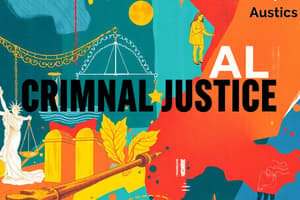Podcast
Questions and Answers
What is the role of the appellant in the appeals process?
What is the role of the appellant in the appeals process?
- To appeal a lower court decision (correct)
- To conduct presentence investigations
- To issue a bench warrant
- To represent the victim in court
What does 'beyond a reasonable doubt' refer to in a criminal trial?
What does 'beyond a reasonable doubt' refer to in a criminal trial?
- The duty of the defendant to prove innocence
- The standard of proof for conviction (correct)
- The likelihood of an appeal succeeding
- The conditions for granting parole
What does 'pretrial detention' mean?
What does 'pretrial detention' mean?
- A fine paid for an offense
- Sentence served without parole
- Bail conditions for release
- Detaining an accused person in jail before trial (correct)
Which of the following refers to money paid to a victim as part of a criminal sanction?
Which of the following refers to money paid to a victim as part of a criminal sanction?
What is the purpose of sentencing guidelines?
What is the purpose of sentencing guidelines?
What does 'En Banc' mean in the judicial context?
What does 'En Banc' mean in the judicial context?
Which of the following describes a bench warrant?
Which of the following describes a bench warrant?
What is a petition for a writ of certiorari?
What is a petition for a writ of certiorari?
In the context of the criminal justice system, what does the term 'burden of proof' refer to?
In the context of the criminal justice system, what does the term 'burden of proof' refer to?
What does 'flat timed' mean in the context of sentencing?
What does 'flat timed' mean in the context of sentencing?
An appellant is the party that has won the court decision and wishes to maintain it.
An appellant is the party that has won the court decision and wishes to maintain it.
The standard of proof required to achieve a conviction in criminal court is called 'Beyond a Reasonable Doubt'.
The standard of proof required to achieve a conviction in criminal court is called 'Beyond a Reasonable Doubt'.
A bench warrant is issued through police action rather than by a judge.
A bench warrant is issued through police action rather than by a judge.
Pretrial detention occurs when a person is held in jail before trial due to not posting bail or being a flight risk.
Pretrial detention occurs when a person is held in jail before trial due to not posting bail or being a flight risk.
Oral arguments provide lawyers a chance to simplify their case's facts without answering any judges' questions.
Oral arguments provide lawyers a chance to simplify their case's facts without answering any judges' questions.
Restitution refers to money paid to the government as punishment for a crime.
Restitution refers to money paid to the government as punishment for a crime.
Sentencing guidelines are established by the United States Sentencing Commission to help trial judges determine sentences.
Sentencing guidelines are established by the United States Sentencing Commission to help trial judges determine sentences.
En Banc refers to all judges of an appellate court hearing a case together.
En Banc refers to all judges of an appellate court hearing a case together.
Bail is the act of releasing a person accused of a crime with no conditions attached.
Bail is the act of releasing a person accused of a crime with no conditions attached.
A monetary fine is a type of alternative punishment that can involve imprisoning the defendant.
A monetary fine is a type of alternative punishment that can involve imprisoning the defendant.
Flashcards are hidden until you start studying
Study Notes
Appeal
- A request made by a party who lost in a lower court to a higher court to review the decision
- Usually, the appellant is seeking a reversal of the lower court's decision
Bail
- Release of a person from jail before trial, under specific conditions
- Conditions are designed to ensure the person appears in court as needed
Bench Warrant
- A type of arrest warrant issued by a judge, not by the police
Beyond a Reasonable Doubt (BRD)
- The legal standard for conviction in criminal court
- The prosecution must convince the jury that there is no other reasonable explanation for the crime except the defendant's guilt
Burden of Proof
- The responsibility to prove disputed facts
- In criminal cases, the burden of proof is on the prosecution
Criminal Justice Funnel
- An analogy to illustrate the large number of crimes committed and the relatively small number of people who are imprisoned
- The funnel represents the decrease in cases as they progress through the criminal justice system
En Banc
- French meaning "on the bench"
- All judges of an appellate court hear a case together, as opposed to a panel of three judges
Evidentiary Standard
- The legally required amount of evidence needed for a specific purpose in the criminal justice system
Flat Timed
- A prison term served in full without possibility of parole
Monetary Fine
- Punishment in the form of money paid to the government
Oral Argument
- Lawyers summarize their cases before the court and answer judges’ questions
Petition for a Writ of Certiorari
- A formal request to the Supreme Court to review a lower court decision
Pretrial Detention
- Detaining an accused person in jail before trial
- Because they did not post bail, or because they are a flight risk or pose a risk to the community
Probation Officer
- Conducts presentence investigations
- Prepares reports on convicted defendants
- Supervises released defendants
Restitution
- Money paid to the victim of a crime as part of the criminal sanction
Sentence
- The punishment given by the court to a convicted defendant
Sentencing Guidelines
- Rules and principles established by the U.S Sentencing Commission that judges use for sentencing
Trial
- A formal process where evidence is examined before a judge
- To determine if a defendant is guilty
United States Circuit Courts
- Historical name for the United States Courts of Appeal
United States Sentencing Commission
- The agency responsible for establishing sentencing policies and procedures in the federal court system
Appeal
- A request to a higher court to review a lower court's decision
- The party making the request is called the Appellant
- The Appellant usually aims to overturn the lower court's decision
Bail
- Temporary release of a person accused of a crime before trial
- Ensures accused person appears in court by setting specific conditions
Bench Warrant
- An arrest warrant issued by a judge, not through police action
Beyond a Reasonable Doubt
- The legal standard of proof required for a criminal conviction
- The prosecution must convincingly demonstrate guilt beyond a reasonable doubt
Burden of Proof
- The party's responsibility to provide evidence supporting their claims
Criminal Justice Funnel
- An analogy showing that although many crimes occur, few result in prison sentences
En Banc
- A hearing where all judges of an appellate court participate
- This is the full court as opposed to the usual panels of three judges
Evidentiary Standard
- The amount of evidence needed to achieve a specific outcome in criminal justice
Flat Timed Sentence
- A prison term served in full without parole eligibility
Monetary Fine
- A financial penalty paid to the government as punishment for wrongdoing
Oral Argument
- Opportunity for lawyers to summarize their case before the court and answer the judges' questions
Petition for a Writ of Certiorari
- A formal request to the Supreme Court to review a lower court's decision
Pretrial Detention
- Holding an accused person in jail before trial
- This occurs because they did not post bail or are considered a flight risk or community danger
Probation Officer
- Conducting presentence investigations
- Preparing reports on convicted defendants
- Supervising defendants who are released
Restitution
- Monetary payment made to the victim of a crime as part of the criminal sanction
Sentence
- Punishment imposed by a court for a convicted defendant
Sentencing Guidelines
- Rules and principles used by trial judges to determine sentences for convicted defendants
Trial
- Formal examination of evidence before a judge to determine guilt
United States Circuit Courts
- Former name for the United States Courts of Appeal
United States Sentencing Commission
- Agency responsible for establishing sentencing policies and procedures for the federal court system
Studying That Suits You
Use AI to generate personalized quizzes and flashcards to suit your learning preferences.




